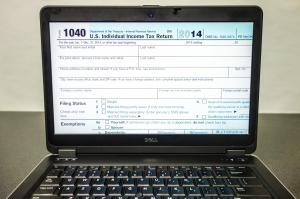Scammers are still using the coronavirus relief stimulus checks earlier this year as a way to obtain information from unsuspecting Americans. On Nov. 4, the Internal Revenue Service, state tax agencies, and members of the tax industry issued a warning on a new text scam that tricks people into giving their bank account information in exchange for receiving a new $1,200 Economic Impact Payment (EIP). However, the EIP included in the CARES Act signed in March 2020 was a one-time payment and Congress still has not passed another payment program.
The IRS and state tax agencies will never ask for bank information from taxpayers in a text, the IRS said in a statement. “You have received a direct deposit of $1,200 from COVID-19 TREAS FUND. Further action is required to accept this payment into your account. Continue here to accept this payment,” the scam message reads. The text ends with a link to a fake phishing web address made to look like a real IRS website. It is built to look like the IRS’ “Get My Payment” tool, which taxpayers can use to track their payments. The website asks visitors to submit personal information, which will then go straight to scam artists, not the IRS.
Videos by PopCulture.com
“Criminals are relentlessly using COVID-19 and Economic Impact Payments as cover to try to trick taxpayers out of their money or identities,” IRS Commissioner Chuck Rettig said in a statement. “This scam is a new twist on those we’ve been seeing much of this year. We urge people to remain alert to these types of scams.”
Anyone who receives the text message is asked to send a screenshot of it and email the image to phishing@irs.gov. The IRS also asks anyone who received it to include the date and time they received the message; the number that appeared on the sender’s caller ID; and the number that received the text. “The IRS does not send unsolicited texts or emails. The IRS does not call people with threats of jail or lawsuits, nor does it demand tax payments on gift cards,” the IRS noted.
Ever since Congress passed the CARES Act and the IRS began sending out the stimulus checks, the agency has frequently warned against different types of scams. In July, the IRS issued a “Dirty Dozen” list of different kinds of scams. These included phishing emails and messages; fake charities; threatening phonecalls impersonating IRS agents; and social media scams.
The IRS began sending the CARES Act stimulus payments in mid-April. They were first sent as direct deposits to taxpayers who previously provided their bank account information to the IRS. The agency also sent payments out as physical checks and as pre-paid debit cards. Americans who are eligible for an EIP but do not pay have to file taxes can still use the Non-Filers tool to apply for the payment through Nov. 21.




